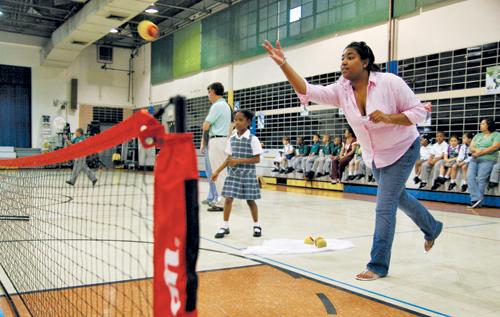Loyola students may find it difficult to opt out of service learning in the future.
“Some students this semester ended up finding themselves in a class for which service learning was required, but they didn’t know that when they registered for the class,” said the director of Service Learning, Kelly Brotzman.
Students in this predicament adhering to the course-withdrawal deadline were allowed to drop the course she said. Students can identify fall courses involving service learning components on LORA by a blue notation beneath the course title where the prerequisites are listed.
Service learning differs from traditional community service because it is accompanied by an academic or research component, often reflecting on the nature of the service provided.
According to Student Government President Cade Cypriano, the University Planning Team discusses increasing service learning among academic departments to enhance Jesuit values, a goal of its Strategic Plan. The Strategic Plan is a scheme crafted by UPT to determine the university’s future academically and financially.
Cypriano said a three-year projection of the proposed plan is that every department develops a course with a service-learning component that accentuates the existing curriculum. The sixth-year portion of the plan is that every graduating senior completes at least one service-learning course he said.
“There have been many people that view the current state of New Orleans to be a liability for the university,” said Cypriano, “and I think that having service learning on a campus like Loyola’s can only make the city of New Orleans a greater asset in a way that the students are enabled to engage with the community in a way that benefits their education and the citizens as well.”
SGA and UPT work to establish an institutional grant for departments interested in establishing a course adhering to the requirements of a service learning program, according to Cypriano. Existing courses with a service-learning component may also be eligible for the grant if their structure meets the service-learning program requirements he said.
According to Brotzman, the university has roughly 15 courses with either mandatory or optional service-learning components; and approximately 200 Loyola students participate in service learning. A few courses with service-learning components this semester include: critical reading and writing instructed by Jennifer Jeanfreau, social justice in New Orleans instructed by Sue Mennino, and second-year Spanish I instructed by Eileen Doll.
“There’s a pretty big conversation going about the pros and cons of requiring service learning,” said Brotzman.
She said she remains open on the issue of whether service learning should be required of Loyola students but wishes to see its growth strategically in departments. Some students already involved in service take a definitive stance on whether Loyola should have mandatory community-service or service-learning requirements.
Music education senior and Loyola University Community Action Program external affairs chair, Woody Rinker, said he supports a community-service and service-learning requirements, emphasizing that institutionalized service provides for consistency.
“If you go out and do a service project with a couple hundred people on a service day, it’s certainly valuable,” said Rinker, “but what’s more valuable to the community partners and organizations is to have something consistent.”
More pros of requiring service learning — backed by research — are increased engagement of students and faculty in the institution and city, increased learning outcomes, and a higher-student satisfaction with their overall learning experience, according to Brotzman.
Sociology junior and LUCAP chairperson of public relations, Chad Carson, said community service should not be required for Loyola students to graduate.
“I’d like to see an environment on Loyola’s campus where everyone would be completing hours, but it would be because they are genuinely interested in performing that service and that it’s pushed by the institution as something we should be doing as Loyola students,” he said.
Josh Daly, associate chaplain of University Ministry and LUCAP staff advisor, mentioned some negative components of requiring community service or service learning. He said as participants increase, the quality, engagement and meaningfulness of the service work sometimes decreases. Daly said he does not oppose mandatory-community service for Loyola students – noting it does have some benefits, but he does not strongly support this position.
“One of the biggest benefits is that, frankly, it makes the university have to put its money where its mouth is a little bit and support those sorts of things – through money, through transportation, through various different measures,” said Daly.
Brotzman said she sometimes refers community organizations to LUCAP and the Office of Student Affairs for assistance if requested service is not ideal for service learners.
“To a large extent, the university has relied on LUCAP to run with student-led and student-driven or student-participation laden community efforts,” said Cypriano.
Service projects and special events require much work, and often, the same 20 people participate, according to LUCAP chairperson and Spanish and Latin American studies senior, Kathleen Warner.
“We are approached several times a year to help other organizations – which is great because we love community involvement, but sometimes our budget and project leaders cannot handle all of it,” said Warner.
Allison Sickle can be reached at [email protected].








